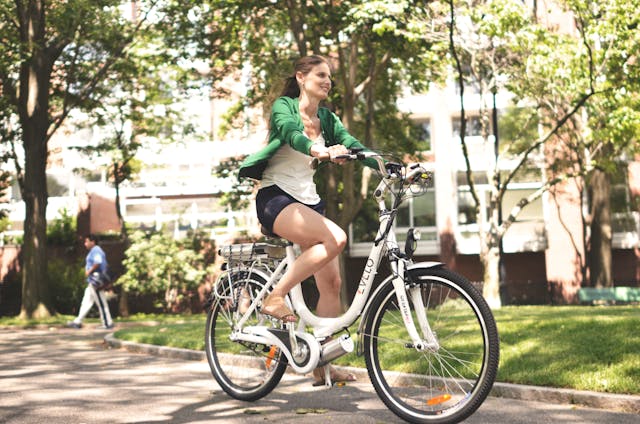Beginner’s Guide: 4 Essential Meal Planning Tips

Ebikes, or electric bicycles, have become increasingly popular for a variety of reasons. They offer an efficient, environmentally friendly, accessible, and enjoyable way to travel. Ebikes lower the barriers for those who may have difficulty using traditional bicycles and encourage seasoned cyclists to ride longer with less fatigue. In addition to practical transportation, using ebikes can have positive effects on health, environmental sustainability, and even future urban planning.
Varieties of Ebikes
All ebikes provide battery-powered support, but different styles cater to various needs:
-
Pedal-Assist Ebikes: These bikes add extra speed and power when riders pedal or when their heart rate hits a preset level, making it easier to tackle slopes and commute without feeling too exhausted.
-
Throttle-Controlled Ebikes: Riders can use twist grips for quick acceleration without needing to pedal, allowing them to rest while the motor continues to propel the bike. This feature is particularly useful for riders with physical challenges or for those looking to take a break during longer rides.
-
Speed Pedelecs: Designed for performance, these models accommodate faster speeds, reaching up to 28 mph, and are gaining popularity among amateur racing enthusiasts in Europe.
-
Cargo Ebikes: Built with sturdy frames and extended racks or baskets, these bikes are perfect for ferrying kids, pets, shopping, or commercial goods—ideal for parents and small businesses.
The freedom and adaptability of ebikes make purchasing one a worthwhile investment. Moreover, the benefits extend far beyond basic transport, offering numerous health and environmental advantages.
Advantages of Ebikes
Ebikes make cycling feasible by offering the following benefits:
-
Improved Cardiovascular Health: Regular biking with elevated heart rates enhances cardiovascular health, improving circulation and stamina.
-
Enhanced Muscle Strength and Endurance: With additional propulsion, riders can pedal faster and cover more distance, building muscle while minimizing fatigue, especially beneficial for those with joint issues or limited mobility.
-
Weight Management and Caloric Burn: Ebiking can burn more calories than walking, encouraging consistent cardio activity without putting undue stress on the body, which is especially helpful for managing weight.
-
Mental Health and Stress Relief: Cycling outdoors reduces anxiety and depression risks while boosting mood through the release of endorphins and dopamine.
-
Cost Efficiency and Convenience: Owning an ebike can save on fuel, insurance, and parking costs, transforming aggravating commute time into an opportunity for savings or leisure.
-
Environmental Impact: Ebikes emit no greenhouse gases, helping communities reduce their carbon footprint and promoting cleaner air and sustainable transport options.
-
Increased Accessibility: Diverse power options make ebiking feasible for people of all fitness levels and ages, including those with specific health concerns.
The myriad of benefits ebikes offer—ranging from personal convenience to broader environmental gains—make them invaluable in transforming urban mobility and sustainability.
Ebikes and Commuting
Replacing cars with ebikes, particularly in urban settings, proves to be a practical change:
-
Faster Urban Travel: With city traffic often jammed, ebikes can offer quicker commutes by bypassing congested roads and utilizing bike lanes.
-
Compatibility with Public Transport: Many transit systems allow ebikes on board, offering seamless integration between suburbs and urban centers without parking woes.
-
Healthier Commuting: Transitioning from driving to cycling can significantly lower risks associated with hypertension and cardiovascular conditions.
Safety Guidelines for Ebike Riders
Adopt common-sense practices to ensure rider safety:
-
Use Protective Gear: Wearing bright, reflective clothing and using lights enhance visibility, providing essential safety measures not afforded by vehicle enclosures.
-
Stick to Bike Lanes: Adhering to marked paths helps avoid risky vehicular intersections.
-
Perform Regular Maintenance: Check tires, lubricate parts, inspect belts, and brakes to prolong its lifespan.
-
Ride Defensively: Assume drivers may not always see you clearly. Make your intentions known, and avoid sudden movements.
Environmental Impact of Ebikes
The widespread use of ebikes impacts the environment positively by:
-
Reducing Community Carbon Emissions: Utilizing ebikes for half of suburban trips in America could cut down to 40 million tons of CO2 emissions annually.
-
Promoting Sustainable Infrastructure: Encouraging investment in bike-friendly city planning increases residents’ preference for greener transportation.
-
Popularizing Green Commuting: The success of ebikes highlights viable alternatives to car reliance without enforced restrictions.
The move towards sustainable transit systems helps shape more livable urban communities, emphasizing human-focused planning.
Caring for Your Ebike
Maintain your ebike through essential practices:
-
Battery Maintenance: Regular, full charging cycles extend battery life, and indoor storage helps avoid temperature damage.
-
Cleaning and Lubrication Routine: Rinsing and lubricating chains prevent wear and tear.
-
Tire Care: Correct inflation optimizes performance and avoids unnecessary wear.
-
Brake Maintenance: Regularly checking and replacing brake pads protects both the pads and rotors, ensuring smooth operation.
The Future of Ebikes
Anticipated advancements in ebikes include:
-
Technological Improvements: Durability, power, and integrated technology are consistently advancing, enhancing both performance and user experience.
-
Increased Market Penetration: As more people observe the benefits of ebiking among peers, adoption rates are expected to rise, promoting a broader cultural shift.
-
Urban Planning Adaptations: Initiatives focusing on reducing emissions through enhanced cycling infrastructure are gaining importance, paving the way for ebike-friendly communities.
Forecasts estimate the ebike market may reach significant growth as more cities recognize the potential of human-centric commuting strategies.
Conclusion
Ebikes offer numerous benefits, including enhanced health, environmental advantages, and practical conveniences, all of which contribute to the long-term sustainability of urban planning. They revolutionize fitness and transportation access, broadening mobility for diverse groups without the physical demands of traditional bikes. Carefully selecting suitable ebike models with expert help ensures optimal use and maximizes the potential benefits of electric biking.



